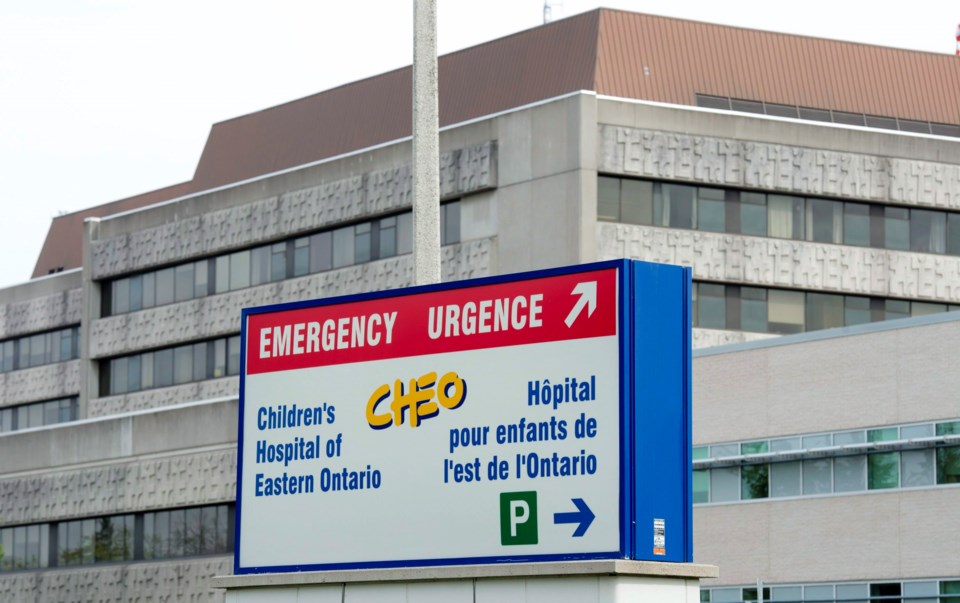A major Ottawa pediatric hospital said Wednesday it's contending with an "unprecedented surge in demand" as it reports a spike in cases of a common respiratory virus that is striking earlier than usual in the year.Â
A CHEO spokesperson said the hospital has admitted 30 children with the respiratory syncytial virus so far this month, compared to pre-pandemic years when it saw an average of three admissions in the month of October.
The spike in RSV cases comes as kids previously shielded by COVID-19 health restrictions are being exposed to it for the first time this fall.
"It's like the perfect storm," said Dr. Anne Pham-Huy, a pediatric infectious diseases expert at CHEO, at a media briefing.
"You have the combination of both a larger susceptible cohort of kids in combination with behavioral stuff like back-to-school and... the mixture of viruses at the same time."Â
The RSV resurgence began last fall in what the hospital called an "early and significant" season with record admissions in September, October and November. The virus usually circulates from November through March.
Doctors at CHEO say this RSV season is also starting earlier than usual, placing pressures on a hospital system grappling with flu season and COVID-19 admissions.
CHEO reports its inpatient and intensive care units are running well over capacity and its emergency room, built for 150 daily visits, is seeing an average of 229.
Hospitals across Canada have struggled with staffing shortages this year amid record-levels of job vacancies in the health-care sector.Â
"CHEO, nor any of our organizations, were built for this kind of demand. Our clinicians, our staff are working as hard as they can," said Alex Munter, CHEO president and CEO.
Doctors at CHEO say it's difficult to predict what lies ahead in the season.
"It could be a prolonged season with moderate levels, or it could be a high peak and then fall off. We don't know what's going to go on. And we don't really have markers to look at, or places to look at that would be able to guide us,"said Dr. Charles Hui, chief of infectious diseases at CHEO.
Common signs of RSV include fever, cough and runny nose, with symptoms often lasting for more than a week. Most children typically get infected by their second birthday.Â
"Most of the time, people do fairly well, unless they're very young, or they potentially have problems with their lungs or their heart," Hui said.
With a larger cohort of kids being exposed for the first time, more of the virus could be circulating in the community, said Dr. Mélissa Langevin, an emergency medicine pediatrician at CHEO. A child exposed multiple times could end up with more of the virus -- a higher viral load -- and develop more severe symptoms.Â
"And we see that with the little babies who are like the third child in the family to get sick and who are having slightly more severe symptoms," she said.Â
Langevin said caregivers should keep an infected child well-hydrated and use a "snot sucker" to help alleviate any congestion. If the child is under two months old, they should be taken to an emergency department, she said.Â
The resurgence of RSV extends beyond Ontario. As of Oct. 15, Quebec led all provinces with an 11 per cent RSV test positivity rate, compared to Ontario's 2.1 per cent and the national average of 3.5 per cent.Â
Backorders in Tylenol and antibiotics only exacerbate the issue, said Dr. Antonio D'Angelo, head of the pediatric emergency department at Montreal's Sainte-Justine hospital.Â
"Many of these kids with RSV do develop ear infections that require antibiotics, and we're starting to see shortages in antibiotics because too many people are sick and, you know, the industry is not able to keep up with the amount of sick people that are requiring these treatments," he said.Â
In Hamilton, a spokesperson for McMaster Children's Hospital said there are less than 10 admitted patients with the virus, but they remain concerned about hospital capacity with reports of an unusually high seasonal surge in viral illnesses.
The Hospital for Sick Children in Toronto did not respond to a request for comment Tuesday.Â
- With files from Cassandra Szklarski.
This report by The Canadian Press was first published Oct. 26, 2022.Â
Jordan Omstead, The Canadian Press



